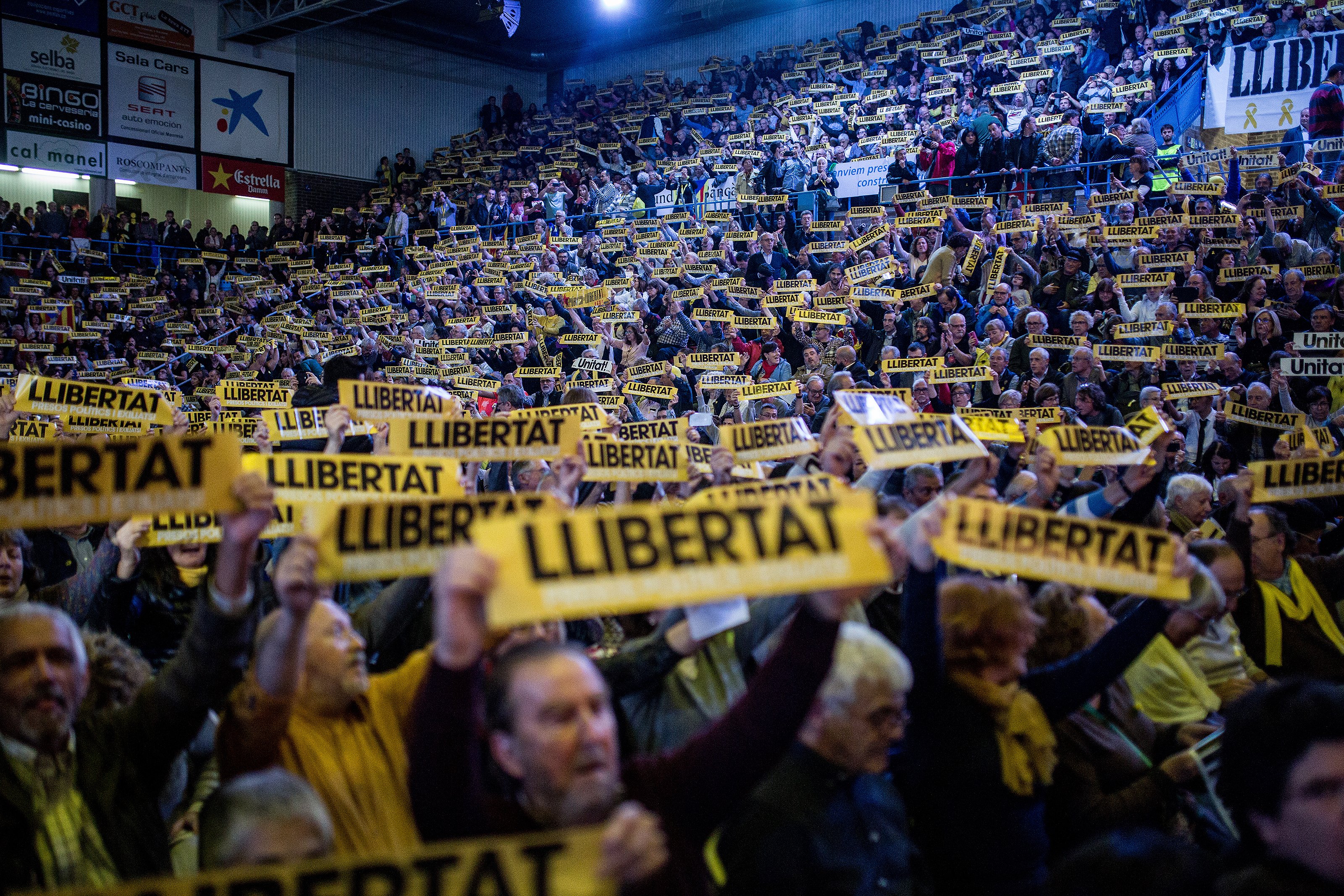On a grey and rainy Saturday, a pro-independence crowd packed out a sports pavilion in the Catalan city of Manresa to be present at the birth of Carles Puigdemont's new pro-independence platform the Crida Nacional per la República - the National Call for the Republic - a new attempt to appeal to the unity of Catalonia's independence movement. And unity was the word that resonated most around the pavilion, while on stage, speakers presented the principles of the new movement: transversality and a commitment to peaceful civic disobedience.
Among those who took part were, unsurprisingly, representatives of both the major pro-independence political groupings in which Puigdemont is a key figure PDeCAT (Catalan European Democratic Party) and, the electoral brand under which it contested the 2017 elections, JxCat (Together for Catalonia). But also present were members of the Catalan Republican Left (ERC) and independents, as well as the children of imprisoned pro-independence leaders Jordi Sànchez and Jordi Turull. This movement already has 51,000 signed-up members and 9,500 'founders'.
Saturday's first rally drew a crowd of around 6,000, too many for Manresa's New Congost covered stadium, and a marquee beside the pavilion enabled all to follow a highly visual and dynamic event, which featured musical performances, and, via video screen, exiled president Puigdemont, but also with considerable protagonism for the Catalan prisoners and exiles, who were mentioned one by one while their photographs were projected.
Peaceful disobedience
Senior member of the Catalan government Elsa Artadi, along with the representative of the Catalan government in Madrid, Ferran Mascarell, read the foundational principles of the Crida. They stated that the platform comes into being in a situation of exceptionality and that it will dissolve itself once the objective - making the Catalan Republic into a reality - is achieved. Artadi and Mascarell explained that the Crida is a peaceful movement but that they do not renounce any peaceful means of achieving independence, even though dialogue and negotiation will be prioritized.
"Our disobedience will be peaceful, persistent and programmed", assured Mascarell, while Artadi appealed for a continuation of the mobilizations: "We have to follow paths of peaceful disobedience and civic protest".
Structure
Gemma Geis and Toni Morral explained that the figures behind the new movement are the two Catalan presidents, Carles Puigdemont, and Quim Torra, along with the imprisoned ex-president of the ANC (Catalan National Assembly), Jordi Sànchez.
Geis stressed that it was an organization in the form of a political movement aimed at making the Catalan Republic effective - there was no mention of whether it would or wouldn't also be a political party - while Morral highlighted the platform's peaceful character. As well, the pair also spoke of the Crida's intended transversality and unity of action.
Jordi Peiró read a message from Jordi Sànchez. "Today's event is one further demonstration that the Spanish state has not got its way. The Catalonia file is still very much open and the last word is still to be written", he said.
Sànchez warns about partisan rivalry
"Those who thought we would become downcast and tamed were mistaken", observed Sànchez, while accepting that not everything that took place after the 1st October referendum worked out, but he asserted that the Crida starts having learned lessons from previous mistakes. The former ANC president labelled the Spanish state as an enemy and has underlined the wish for the new movement to be plural.
The independence leader admitted that "if some things were not done well it was due to a lack of confidence and partisan rivalry"; by contrast, he stated that if the referendum on 1st October was able to take place, it was due to unity. Given this situation, he encouraged supporters to overcome their political and personal differences. "The parties are necessary, indispensable, but the exceptional situation that we are living through forces us to go beyond the parties", said Sánchez.
He warned the listening crowd that the prosecutions demand for those accused in the referendum trial will add up to hundreds of years of prison and he called on people to respond in a public-spirited and nonviolent way. "Please maintain your dignity, those of us in prison will maintain ours", he concluded.
ERC and ex-socialists
Speeches began with Manresa's mayor Valentí Junyent, the economist Xavier Sala-Martín, university professor Ramón Cotarelo and a broad range of political representatives. Also among those who spoke were former Catalan Socialist (PSC) minister Marina Geli, Montblanc mayor Santi Vilanova, and ERC-linked politicians Pep Andreu and Maria Àngels Cabasés; Port de la Selva mayor and president of the Association of Municipalities for Independence, Josep Maria Cervera; the mayor of Valls and JxCat spokesperson, Albert Batet; Sant Cugat's mayor, Carmela Fortuny; and the children of the political prisoners, including Oriol Sànchez, Laura Turull, and Elisabet Forn.

